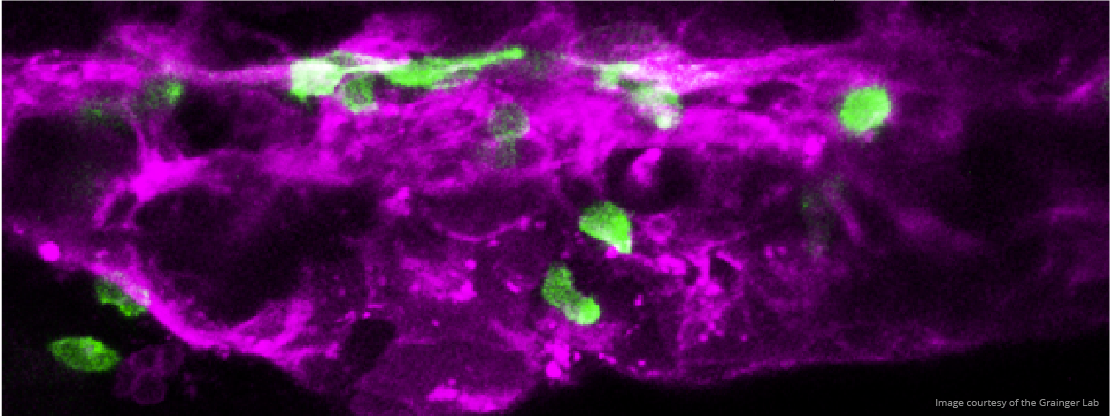Van Andel Institute scientist earns $2.4 million grant to investigate cellular communication in development and disease
September 27, 2021

GRAND RAPIDS, Mich. (Sept. 28, 2021) — Van Andel Institute’s Stephanie Grainger, Ph.D., has been awarded a $2,375,000, five-year Maximizing Investigators’ Research Award from the National Institute of General Medical Sciences of the National Institutes of Health. This prestigious grant will support Grainger’s exploration of a critical type of cellular communication that drives healthy development and, when disrupted, can spur cancer, osteoporosis, heart conditions and other diseases.
Called Wnt (and pronounced “wint”), this vital molecular pathway is central to a host of important processes that guide the body’s construction early on and that continue throughout life, such as tissue regeneration during healing.

“Much like the foreperson at a construction site, Wnt controls nearly everything the body does throughout development: for example, it communicates where the head should go versus the feet and, in adults, coordinates resources to heal wounds and replenish stem cells,” Grainger said. “I am honored to receive this award, which will help us answer longstanding questions that have profound implications for correcting errors in the Wnt pathway as a means to treat disease.”
Scientists have long been interested in Wnt as a potential target for new cancer therapies but developing such treatments has proven to be difficult. The problem lies in a lack of insight into the specific interactions between molecules in the vast Wnt network. A better understanding of these interactions could help scientists develop highly targeted approaches that fix specific problems while leaving the rest of the pathway untouched — and producing fewer side effects.
Grainger and her team will focus on two major players in the pathway: Wnt9a and Fzd9b. These molecules, which are found on the outside of cells, interact to convey chemical messages to and from cells. What isn’t clear, Grainger says, is how Wnt9a and Fzd9b enter the cell to deliver their information payload.
“The Wnt pathway operates in a careful balance — too much or too little Wnt activity can have devastating consequences,” Grainger said. “Solving the exact mechanism by which Wnt9a and Fzd9b carry out their job could have massive implications for therapeutic development and a ripple effect for understanding other parts of the pathway.”
Maximizing Investigators’ Research Awards are highly competitive and provide scientists “with greater stability and flexibility, thereby enhancing scientific productivity and the chances for important breakthroughs,” according to the NIGMS. Grainger is the second VAI investigator in the last four years to earn this award. She joined VAI’s Department of Cell Biology in August.
Research reported in this publication was supported by National Institute of General Medical Sciences of the National Institutes of Health under award no. R35GM142779 (Grainger). The content is solely the responsibility of the authors and does not necessarily represent the official views of the National Institutes of Health.
###
ABOUT VAN ANDEL INSTITUTE
Van Andel Institute (VAI) is committed to improving the health and enhancing the lives of current and future generations through cutting edge biomedical research and innovative educational offerings. Established in Grand Rapids, Michigan, in 1996 by the Van Andel family, VAI is now home to almost 500 scientists, educators and support staff, who work with a growing number of national and international collaborators to foster discovery. The Institute’s scientists study the origins of cancer, Parkinson’s and other diseases and translate their findings into breakthrough prevention and treatment strategies. Our educators develop inquiry-based approaches for K-12 education to help students and teachers prepare the next generation of problem-solvers, while our Graduate School offers a rigorous, research-intensive Ph.D. program in molecular and cellular biology. Learn more at vai.org.
Media Contact
Beth Hinshaw Hall
Van Andel Institute
[email protected]
616-822-2064